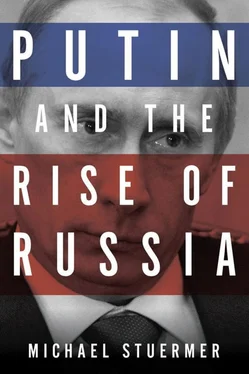But Russia has to be careful in assessing the damage, including the damage to its own national interest. Support from its Central Asian friends was slow in coming. The Chinese signalled open disapproval. The impact on all those inside Russia dreaming of self-determination is not difficult to guess. The wider repercussions across the whole of Asia will become clearer as time goes by.
There is no need to look for a repeat performance of the Cold War. At best what could and should be restored is a healthy respect for the other side, its instincts and its needs, including face-saving, inspired by nuclear weapons and resulting not only in the vast and complex arms-control architecture but also in a sense of global responsibility. Moreover, ever since the dual crisis over Berlin and Cuba in 1958–1962, an exercise in brinkmanship if ever there was one, both superpowers were united in an informal but effective cartel of war avoidance. This also included respecting security distances and zones of influence.
Today, a new Great Game is taking shape. The new rules, however, are not fixed. The new players are inexperienced, ignoring at their own peril – and at everybody else’s peril – the rules so painfully learned at the time of the great confrontation. The so-called ‘post-cold-war’ period has come to an end. A new era of limited confrontation has begun. Confrontation and competition, but also cooperation in an uncertain mix, are on the agenda. US neo-containment meets Russia’s imperial instincts and uncertainties. Where does the US democracy mission find its limits? And where does Russia’s Near Abroad end? Maybe at the border posts. Maybe where Russians live, many on the other side of those posts. Two uncertain giants are moving in uncertain directions, sure of where to draw the red lines which the other side must not cross, but unsure about self-restraint and that brutal discipline which, at the time of the Cold War, nuclear weapons imposed on those in power.
Will the Europeans pull themselves together and finally, in the face of mounting danger, translate economic power into international muscle? This is hard to believe, given the recent experience when Europeans where faced with the Caucasus imbroglio: the East Europeans firmly on the side of the US, the West Europeans including Germany trying desperately to steer clear of a new Cold War. All in all, the Europeans, without a coherent energy strategy or a concept of how to deal with a resurgent Russia, did not cut a dashing figure. Those differences, today still in the early stages, could well develop into a serious rupture – almost irrespective of the future course of NATO enlargement.
The stand-off between the superpowers of the Cold War taught them a harsh lesson: negotiate, or perish. The drama in the Caucasus also holds some lessons. But so far it is doubtful that those involved are willing to understand what is at stake.
DEMOGRAPHY
Births and deaths in Russia 1960-2004

Nationalities

Migration in the Russian Federation

Migration from CIS-States into the Russian Federation

The Demographics of Russia

Oil Prices, 1994 – March 2008

Epigraphs from Marquis de Custine: Journey for Our Time: the Journals of the Marquis de Custine . Russia 1839. Phoenix London 2001 (first published Arthur Barker Ltd 1953).
Books
Adomeit, Hannes: Die Sowjetmacht in internationalen Krisen und Konflikten . Verhaltenmuster, Handlungsprinzipien, Bestimtnungsfaktoren. Reihe Internationale Politik und Sicherheit. Baden-Baden 1983.
Altrichter, Helmut: Kleine Geschichte der Sowjetunion 1917-1991 . München 1993. Aron, Leon: Yeltsin: A Revolutionary Life . London 2000
Baker, Peter; Glassner, Susan: Kremlin Rising: Vladimir Putin’s Russia and the End of Revolution . New York 2005.
Barysh, Katinka: The EU and Russia: Strategic Partnership or Squabbling Neighbours . London: Centre for European Reform 2006.
Beschloss, Michael R.; Talbott, Strobe: At the Highest Levels: the Inside History of the End of the Cold War . Boston 1993.
Brown, Archie; Shevtsova, Lilia: Gorbachev, Yeltsin, and Putin: Political Leadership in Russia’s Transition . Brookings Institution 2001.
Conze, Eckart; Schlie, Ulrich; Seubert, Harald (Hg.): Geschichte zwischen Wissenschaft und Politik . Festschrift für Michael Stürmer zum 65. Geburtstag. SWP, Baden-Baden 2003.
Erffa, Wolfgang von: Das Vermächtnis des Eisernen Emirs: Afghanistans Schicksal . Böblingen 1989.
Finon, Dominique: Russia and the ‘Gas OPEC’: Real or Perceived Threat? Ifri, Electronic Collection Russie. Nei.Visions. 2007.
Friedman, Thomas: The World is Flat: a brief history of the globalized world in the 21st century . London 2005.
Goldfarb, Alex; Litvinenko, Marina: Death of a Dissident: the Poisoning of Alexander Litvinenko and the Return of the KGB . New York 2007.
Gratchev, Andrei: L’Histoire Vraie de la Fin de l’URSS: Le Naufrage de Gorbachev . Editions du Rocher 1992.
Grotzky, Johannes: Herausforderung Sowjetunion: Eine Weltmacht sucht ihren Weg . München 1991.
Hoffman, David E.: The Oligarchs: Wealth and Power in the New Russia . 2001
Horvath, Robert: The legacy of Soviet dissent . London 2005.
Jack, Andrew: Inside Putin’s Russia . London 2004.
Kennedy, Paul: The Rise and Fall of the Great Powers: Economic Change and Military Conflict from 1500 to 2000 . New York 1987.
Kissinger, Henry. Diplomacy . New York 1994.
Korinman, Michel; Laughland, John (Eds.): Russia: a New Cold War? Vallentin Mitchell Publishers 2008.
Kotkin, Stephen: Russia under Putin: Democracy or Dictatorship? Washington DC 2007.
Leffler, Melvyn P.: For the Soul of Mankind: the United States, the Soviet Union, and the Cold War . New York 2007.
Levgold, Robert (Ed.): Russia’s Foreign Policy in the Twentieth Century and the Shadow of the Past . New York 2007.
Luks, Leonid: Zwei Gesichter des Totalitarismus: Bolschewismus und Nationalismus im Vergleich . Köln 2007.
Lyne, Roderic; Talbott, Strobe; Watanabe, Koji: Task Force Report to the Trilateral Commission: Engaging with Russia: The Next Phase . Trilateral Commission, June 30, 2006.
The Military Balance 2007 . IISS London 2007.
Nerlich, Uwe (Ed.) Die Einhegung sowjetischer Macht. Kontrolliertes militärisches Gleichgewicht als Bedingung europäischer Sicherheit . SWP, Reihe Internationale Politik und Sicherheit. Baden-Baden 1982.
Читать дальше

















